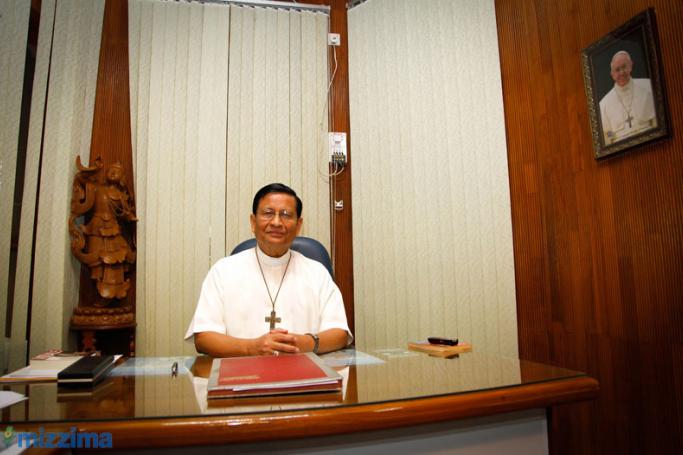In December, just before Christmas, a small, sleepy, remote, rural village in central Myanmar sent out a powerful message of hope to the entire nation. One evening, in front of an audience of thousands sitting under the stars on tarpaulin, Buddhist, Christian, Muslim and Hindu clergy gathered on a large stage to light a candle for peace and inter-religious harmony and deliver speeches promoting this message.
The occasion was the celebration of Cardinal Charles Maung Bo’s twenty-five years of service as a Catholic bishop. The place was his birthplace, the village of Monhla, in Sagaing Division, an hour or so down dirt tracks from Shwe Bo and four hours’ from Mandalay.
Earlier that day, one of Myanmar’s most influential Buddhist monks, Sittagu Sayadaw, came to Monhla to honour Cardinal Bo and preach a message of peace. He spoke about the need for different religions to respect one another and live in peace.
That evening, Myawaddy Sayadaw, a prominent monk from Mandalay, arrived, and joined Cardinal Bo, as well as a Muslim and Hindu leader, on the main stage.
Cardinal Bo had earlier told me that although the festivities around the celebration of his Jubilee – a quarter of a century as a bishop – were fun, including Kachin dancing, fireworks, balloons, a cake and live musical performances, his real intention for the occasion was to use the platform to deliver a message of peace and inter-religious harmony. Such initiatives, he added, are more regular in the major cities, with civil society activists and religious leaders engaged in a wide range of activities to counter religious intolerance and nationalism, but are rare in rural grassroots communities. And it is in such places where prejudice and religious nationalism particularly need to be countered. Monhla is unusual in that the population is about fifty per cent Buddhist and fifty percent Catholic, and for centuries, the two communities have lived together in harmony. Cardinal Bo wanted to show his home village that people of different religions can – indeed, must – not only live together but stand together.
“We must act against the attitudes of one race, one religion and one language in Myanmar,” Cardinal Bo said during his homily. And while there is new hope after the landslide victory by Aung San Suu Kyi and the National League for Democracy in the election last November, the cardinal warned that freedom of expression should not be abused to incite hatred of others. He urged people to show love and compassion to each other and seek peaceful co-existence among Myanmar’s different religions and races.
This initiative is typical of Cardinal Bo, who in recent years has emerged as perhaps Myanmar’s most consistently and courageously outspoken voice, among national-level leaders, for religious freedom and inter-religious harmony. And it is encouraging that an increasing number of people, from all religions, are adding their voices to his. Brave Buddhist monks are working to counter Ma Ba Tha and those who preach hatred, and a growing number of civil society groups are engaging in efforts to counter religious nationalism.
Before the elections, the vocal influence of Ma Ba Tha was a cause for very grave concern. The passage of the four race and religion ‘protection’ laws was alarming, the daily spread of hate speech deeply troubling, and the potential for renewed violence very real. Many predicted religiously-motivated violence in the aftermath of the election.
The fact that such violence did not occur is a relief. The fact that Ma Ba Tha’s election message was roundly defeated is a cause for celebration. And the message from Daw Aung San Suu Kyi, in an interview with the BBC’s Fergal Keane just days after the election, is a cause for hope. She promised that an NLD-government would protect religious minorities, and prosecute those who incite hatred. “Prejudice is not removed easily and hatred is not going to be removed easily,” she said, but added: “I'm confident the great majority of the people want peace… they do not want to live on a diet of hate and fear.”
There are, therefore, grounds for hope. But equally, there is a need for continued vigilance and renewed efforts to promote peace. The silence of Ma Ba Tha since the election is surprising, but it does not mean they have gone away. They may well be licking their wounds and preparing to regroup. All the more reason for people of all races and religions in Myanmar to heed the words of Cardinal Bo in his Christmas message: “Religion teaches us to love and care for one another: ‘Karuna’ and ‘Metta’ are the foundations of all religions. As we live virtuous lives we are to show love and respect to others.” Conflict, war and violence in the name of religion represent the “sad reality” of today’s world, he said, and he called on all religious leaders to resist “all attempts to abuse religion for political purposes”. Myanmar’s future, he added, “depends on the positive role of religious leaders. The goodwill of religion is the capacity to live in harmony with different faith and religion.”
Myanmar’s new government faces many challenges and many competing priorities. The support of the international community will, similarly, be required on many different fronts. But Myanmar’s future depends on peace, and so the protection of religious freedom, the prevention of religious intolerance, and the celebration of religious diversity must remain priorities for everyone for some time to come.
You are viewing the old site.
Please update your bookmark to https://eng.mizzima.com.
Mizzima Weekly Magazine Issue...
14 December 2023
Spring Revolution Daily News f...
13 December 2023
New UK Burma sanctions welcome...
13 December 2023
Spring Revolution Daily News f...
12 December 2023
Spring Revolution Daily News f...
11 December 2023
Spring Revolution Daily News f...
08 December 2023
Spring Revolution Daily News f...
07 December 2023
Diaspora journalists increasin...
07 December 2023
Landslides kill 12 as monsoon batters refugee camps












